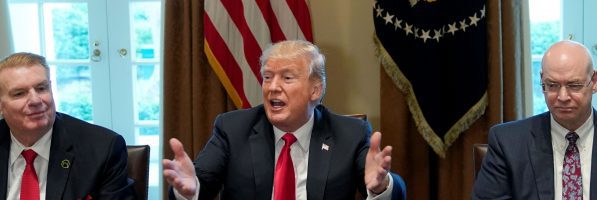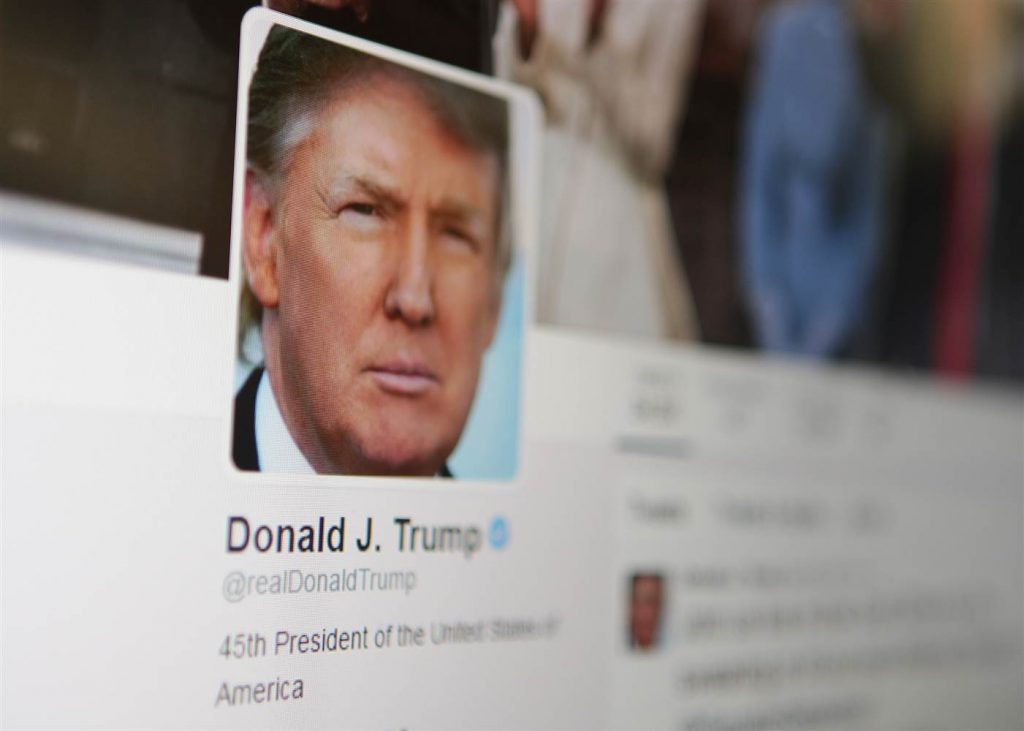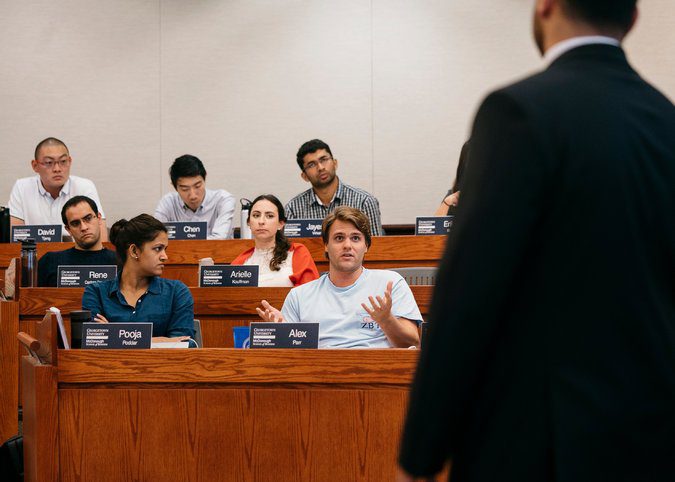Harvard Faculty Discuss Recent Chinese Tariffs, and More – Boston News

Let’s explore some of the most interesting stories that have emerged from Boston business schools this week.
Trade War or War of Words? – Harvard Business School Blog
Following the Trump administration’s recent announcement of 25 percent tariffs on 1,000 Chinese exports, Bill Kirby and Willy Shih, Harvard Business School faculty experts on China, took to the HBS blog to “trade theories on the best path forward for the world’s two largest economies.”
Both experts point to economic shifts in the 1980s, which, not incidentally, was the decade in which Donald Trump started to become a household name. Kirby notes that the major trade distinctions between the United States and Japan, specifically regarding the auto-manufacturing industry, set a precedent. In that, the United States began to firmly invest in Japanese car companies like Honda and Toyota, building their own domestic manufacturing plants. Kirby suspects, however, that the Trump administration may not be as open to that kind of investment. “If Chinese companies wanted to improve access to American markets by investing in the US, would the administration be open to it?” he asks. “They ought to be, in my view. But my suspicion is that that’s not the outcome that this administration is looking for. They’re looking for a miraculous recovery of American-based manufacturing exporting to a Chinese market, not a particularly good match.”
Shih, staying on the topic of the ’80s, offers a different opinion, saying; “I think the real issue is industrial policy on the Chinese side competing with a lack of industrial policy on the U.S. side and the consequences of that. Going back to the mid-1980s, the Chinese government has been mapping a pathway for the country to become a modern country (just as the Koreans, Taiwanese, and the Japanese did before, except on a much larger scale). The Chinese have identified core capabilities that they want to see inside the country, and they’ve been methodically working on that over the last 30-plus years. I’d argue the positive trade balance with the US reflects the progress they’ve made.”
You can read the full conversation between Kirby and Shih here.
An Easy Internship Trick from Kayla Humel ’18 – Simmons Blog
Current Simmons School of Management student body president Kayla Humel, ’18, wrote candidly about the impact of the Student Government Association (SGA) on her recent internship at Puma and future career plans.
“First and foremost, [SGA has taught me] the power of good communication. When the e-board is communicating with one another, event planning is exponentially easier. When SGA is communicating with organizations, processes like budgets occur seamlessly. Good communication is crucial to success in any organization.”
Humel threw her hat in the presidential race because she “saw opportunities to improve processes between SGA and the other organizations on campus. I knew that SGA could create change on campus and I wanted to play a major part in that.”
You ca check out more about her Simmons experience here and watch an interview with Humel about her internship below.
Wield Polarization to Build Positive Change – MIT Sloan Newsroom
MIT Sloan School of Management sustainability initiative director Jason Jay used his recent TEDx talk as an opportunity to share some strategic advice on how to more effectively spark difficult conversations. “The voltage feels so high that we simply avoid conversations out of fear of getting shocked. But I like to think about that polarization as a kind of energy.”
- Draw a contrast between what others might expect you to do and what you’re really trying to do.
- Clarify the values underlying your positions, and do the same with the people you’re talking to.
- Make it clear that you aren’t meeting simply to bargain over these values, but to embrace tension and find new ideas.”
You can check out Jay’s TEDx talk at Hofstra University below and learn more about his work here.
Boston News: Northeastern Explores Trump Tweets, MIT Offers FinTech Advice and More

Let’s explore some of the most interesting stories that have emerged from Boston metro business schools this week.
Can A Trump Tweet Dramatically Sway A Company’s Value? – Northeastern’s D’Amore-McKim Blog
Will Clark, DMSB ’17, along with Northeastern University D’Amore-McKim School of Business finance professors David Myers and Jeffery Born, sought to understand the impact that President Trump’s tweets—which often directly address publicly traded companies like Ford, Toyota, Walmart, GM, and Boeing—had on their stock market value.
“Past presidents communicated through the media. This was the first time that a president was communicating directly with the public—with investors—about companies. We really weren’t sure what to expect from the data,” says Clark, who is now a credit analyst with Morgan Stanley.
The trio’s research found that Trump’s tweets, in fact, did have some impact on companies, often increasing trade volume within the first few hours and days after he references them on the social media platform. The research was revealed in the academic journal Algorithmic Finance.
“The team found that Trump’s tweets dramatically increased trading volume for the companies’ stocks in the first few days following a tweet. They also found that positive (or negative) tweets about companies increased (or decreased) the firms’ stock prices by a modest amount—just 1 percent. But the changes were only temporary: Within a few days, the firms’ trading volumes and stock prices returned to pre-tweet levels.”
The lasting effect, however, was found to be longing. The trio notes that the most active traders, which they refer to as “noise traders,” were very reactive to Trump’s words, with trading tapering off after only a few days.

“They’re regular people and under-informed investors who want to get in and out and make a buck without thinking too long and hard about it,” Born notes about the financial impact of Trump tweets.
You can read more about the financial research on the Trump tweets from D’Amore-McKim here.
3 Lessons To Keep In Mind When Starting A FinTech Venture – MIT Sloan Newsroom
MIT Sloan School of Management MBA alum Sophia Lin, ’12, and her partner Andrew Kelley of the FinTech startup Keel, which connects “rookie investors with more seasoned ones,” shares some hard-won lessons in an op-ed for the Sloan blog. First of all: beware of hidden costs specific to FinTech. “
“Starting costs are higher than other industries because of data, infrastructure, and security requirements,” Lin said. “Data is expensive, which stops a lot of early stage startups from entering this field. But you need data to build your product.”
Read all of Lin’s words of wisdom here.
More CEOs Have Begun To Take Social Responsibility Seriously – HBR
CEOs from Facebook’s Mark Zuckerberg to Blackrock’s Larry Fink have begun to take very public stands to address the long-term impacts their products have had and continue to have on communities and the environment.
“We are witnessing a big, transitional moment—akin to the transition from analog to digital, or the realization that globalization is a really big deal. Companies are beginning to realize that paying attention to the longer term, to the perceptions of their company, and to the social consequences of their products is good business.”
Harvard Business School John and Natty McArthur University Professor Rebecca M. Henderson also explains that there are distinct differences between the size of a company, which often contrasts with the social goals of the company. The larger the company, the more long-term the outlook, she explains. Unlike small companies, larger firms worry about quarter-to-quarter results less.
“Big firms can also internalize certain externalities. An externality is a cost from a transaction that doesn’t fall on the buyer or the seller. If I pollute the air to make a product I sell to you, the cost of that pollution is spread out across society, and isn’t incorporated in the price I charge you for the product. Externalities pose problems for markets, since neither buyer nor seller have any incentive to deal with the costs. But sometimes, for really large firms, things work differently.”
The unfortunate causality, she notes, is that we are often reliant on the largest companies to take the initiative for causes that may be considered part of the global good. If some companies among the Fortune 500 elect to, say, go carbon neutral within the next decade, that can have a profound impact on other competing companies. And if those initiatives are not as profitable, there is an even greater risk of other companies being reluctant to attempt similar efforts.
Read more about the growing CSR trend among CEOs here.
Top Schools Tackle Sexual Harassment, NFL Protests, and More

Should business schools teach ethics and social responsibility? In the past, top MBA programs stuck to a fairly typical curriculum: finance, marketing, accounting, economics. And while those topics still comprise the core of most MBA programs, they’re now only a part of the whole.
Beyond allowing MBA students to focus their studies in areas like entrepreneurship or technology, MBA programs are also taking on some of the most prominent ethical topics of the day, asking students to weigh in on current headlines and happenings. It’s the MBA ethics debate.
According to a United Nations group survey of business school students from around the world, students believe that ethics are a business’s most important responsibility. According to the report, “the exposure to, and teaching of, business ethics does not merely assist business leaders to resolve moral dilemmas. More importantly, it matures their proficiency in moral judgment and their ability to incorporate social issues in the decision-making process and assists them in implementing this in an all-inclusive manner.”
For example, last year a group of business executives—including the CEO of PepsiCo and head of General Motors—got together to dissolve two business councils that consulted with President Trump after insensitive remarks about the white supremacist violence that took place in Charlottesville, VA. And other executives such as the CEO of Patagonia, Yvon Choinard, have been vocal about political and ethical issues—even using their companies to take positions on social responsibility that would typically be considered outside the scope of business.
So, it’s no wonder many business schools have been making business ethics a more important part of their curriculum. The question is, “How should business ethics be added to the MBA curriculum, and how is it being added currently?” It depends on the school.
At Georgetown University’s McDonough School of Business, Professor Edward Soule teaches courses on business ethics, corporate social responsibility, and leadership. During these classes, he told the New York Times that he has assigned coursework covering a range of trending topics including sexual harassment at Uber, social justice protests by N.F.L. players, and how companies like Amazon have responded when attacked by President Trump.
“Something has changed,” Soule said. “I would be kidding you if I told you there wasn’t a different vibe in the classroom. Ethics and values have taken on more significance. It has to do with all of the things going on in this administration, often things that challenge our understanding of ethics and leadership.”

Students discuss the recent NFL protests in Prof. Ed Soule’s class at Georgetown’s McDonough School of Business. Photo via Justin T. Gellerson for The New York Times.
Georgetown McDonough is also home to the Institute for the Study of Markets and Ethics (GISME), a center that examines the ethical issues inherent in the functioning of a market society. Students, faculty, and researchers who participate in the center explore ethical questions as they relate to business and bring ethical considerations to bear on policy decisions regarding the regulation of markets. These are especially salient issues for Georgetown McDonough given its Washington D.C. location.
“At the McDonough School of Business, we have developed a method of teaching business ethics that includes normative experiential learning, communicates in terms readily understood by business students, and involves actual ethical decision-making on the part of the students,” Michael Douma, assistant research professor and director of GISME, said in a news release. “We have found that our approach results in students being more invested in the course and more committed to resolving ethical issues that confront them in a business environment.”
Another example can be found at Carnegie Mellon’s Tepper School of Business. According to John Hooker, a professor of operations research and business ethics and social responsibility, ethics has been a part of the Tepper School curriculum since the 1990s. “Our program was apparently the first to introduce the topic (1966), as part of a course on business law,” Hooker told us. “The ethics presence has gradually increased over the years, but we ethics faculty often have to fight for it. My view is that a required ethics course should be part of the picture.”
And Leanne Meyer, co-director of the Accelerate Leadership Center at the school, told the New York Times, “There’s a turning point in what’s expected from business leaders. Up until now, business leaders were largely responsible for delivering products. Now, shareholders are looking to corporate leaders to make statements on what would traditionally have been social justice or moral issues.”
As for ethics and MBA students, Tepper’s core offering in Ethics and Leadership is one of the only second-year courses it requires its students to take. The course teaches students how to foster their ability to reason and how to handle the ethical implications of managing organizations and people.
“The basic lesson for MBA students is that business ethics is not optional,” explained Hooker. “It is the basis for the social infrastructure that makes business possible, much as engineering is the basis for physical infrastructure. It requires careful analysis and training, no less than engineering or finance. This is why we need a stand-alone ethics course. Business ethics training teaches us to do ethics with our brains rather than rely on gut feelings. Otherwise, we have no way to reach consensus on the ground rules.”
In the end, there are many options for MBA students interested in ethics, though ultimately it up to the students themselves to raise topics that are pressing to them. “Ethics courses often focus on the hot topics. This stimulates discussion and raises course ratings, but it generates more heat than light,” said Hooker. “I focus on issues that students themselves raise. I also emphasize cross-cultural ethics, because business is global, and norms vary enormously around in the world. U.S. students typically have little awareness of this.”
Whether through case studies, guest speakers, simulations, competitions, or another initiative, the leading MBA programs dive into business ethics and corporate responsibility using a range of approaches. To learn more about Professor Hooker’s approach to ethics, you can check out his blog: Ethical Decisions.
